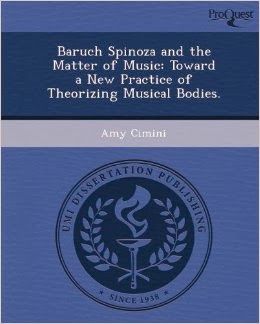Spinoza & the Matter of Music
 En zo komt Spinoza ook eens
uitgebreid voor in een historisch filosofisch musicologische studie
waar Ferdi Fluitsma mij op wees, namelijk
En zo komt Spinoza ook eens
uitgebreid voor in een historisch filosofisch musicologische studie
waar Ferdi Fluitsma mij op wees, namelijk
Amy Cimini, Baruch Spinoza and the Matter of Music: Toward a New Practice of Theorizing Musical Bodies. A dissertation submitted in partial fulfillment of the requirements for the degree of Doctor of Philosophy Department of Music, New York University. September, 2011. ProQuest, UMI Dissertation Publishing (October 19, 2012) [PDF en bij Amazon]
 Amy Cimini schrijft: "My work on embodiment is based on the philosophy of Baruch Spinoza, and I hope to introduce music studies to a discourse on embodiment that contests Cartesian dualism from its very moment of inception." [Cf.]
Amy Cimini schrijft: "My work on embodiment is based on the philosophy of Baruch Spinoza, and I hope to introduce music studies to a discourse on embodiment that contests Cartesian dualism from its very moment of inception." [Cf.]
En bij een cursus die ze momenteel geeft vat ze haar werk aldus samen:
The notion that musical sound is
made by bodies and circulates within and among bodies
is axiomatic in both popular and academic accounts of musical
performance and listening. My research develops an intellectual
history of the mind-body problem in order to theorize the pleasure,
intensity and sociality typically ascribed to musical embodiment and
embodied knowledge in contemporary thought. Showing that much of
music studies’ engagement with musical bodies has taken shape as
moral opposition to René Descartes infamous mind-body dualism, I
develop an alternative ethical approach through the thought and
reception of one of Descartes’ earliest and most radical critics:
Baruch Spinoza (1632-1677). In his Ethics (pub. pth. 1677),
Spinoza theorizes the body as constitutive of the mind, overcoming
Descartes’ dualism with a robust account of mind-body unity and
interaction. Reconstructing Descartes’ dualism through his
Compendium of Music (1618), I render its Spinozistic
overcoming as a challenge to rethink how music distributes ethical
and social knowledge through its material action upon and within
bodies.
[Cf.]
Foto van Dr. Cimini met de viool van hier waar ook veel info over haar wordt gegeven.


Reacties
Humhh, 'body as constitutive for the mind' ? Spinozistic music?
Wim klever 29-11-2013 @ 16:07
Ja, voor de goede verstaander. I.t.t. Descartes bij wie geest los van lichaam kon bestaan, maakt bij Spinoza geest altijd a.h.w. een samenstellend element (nou ja, aspect), en omgekeerd idem dito een lichaam een constitutief 'bestanddeel' (nou ja, aspect) uit van wat samen met het idea bijeen genomen één geheel ding is. Geen mind zonder body en vice versa. Zo moet het bedoeld zijn. Een dans, of ook muziekspel is daar een mooi beeld voor. Spinozistic music - waarom niet? Juist een Spinozist kan goed uitleggen de eenheid die de beweging en de melodie uitmaken als twee kanten van eenzelfde proces.
Stan Verdult 29-11-2013 @ 16:45